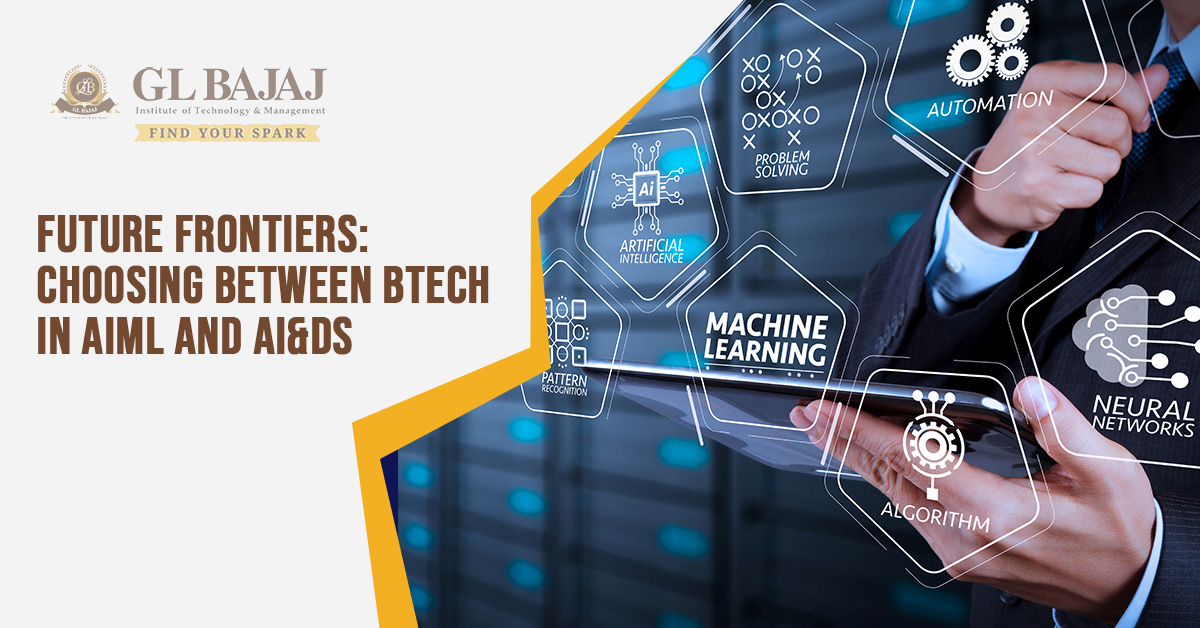In the changing landscape of technology, the choice of an undergraduate engineering course is important for shaping a future-ready career. Two emerging fields, namely Artificial Intelligence and Machine Learning (AIML) and Artificial Intelligence and Data Science (AI&DS), are gaining prominence for their potential to revolutionize industries. In this blog, we’ll go into the differences between BTech in AIML and AI&DS, exploring their unique features.
BTech in AIML
Artificial Intelligence and Machine Learning, the powerhouses driving innovation across industries, constitute a specialized domain that focuses on creating intelligent systems. A BTech in AIML equips students with the knowledge and skills to develop algorithms and models that enable machines to learn from data, recognize patterns, and make decisions with minimal human intervention.
Machine Learning Algorithms: Understanding and implementing algorithms that enable machines to learn and improve from experience.
Data Science: Analyzing and interpreting complex data sets to derive meaningful insights.
Natural Language Processing (NLP): Enhancing machines’ ability to understand, interpret, and generate human-like language.
Computer Vision: Developing systems for machines to interpret and make decisions based on visual data.
Future Prospects:
– AI Research and Development: Graduates can contribute to groundbreaking research in AI, exploring novel algorithms and methodologies.
– Data Scientist: With expertise in data analysis and interpretation, AIML graduates are well-suited for roles as data scientists, addressing complex business challenges.
– AI Engineer: Designing and implementing intelligent systems for various applications, from healthcare to finance.
BTech in AI&DS
Artificial Intelligence and Data Science, an interdisciplinary field, emphasizes taking the power of data to drive decision-making. Pursuing a BTech in AI&DS empowers students with the skills to extract valuable knowledge from vast datasets, aiding organizations in making informed choices.
Big Data Analytics: Processing and analyzing large sets of data to reveal patterns and trends.
Machine Learning for Data Science: Integrating machine learning algorithms into the data science workflow for predictive modeling.
Business Intelligence: Translating complex data into actionable senses to support organizational strategies.
Data Warehousing and Mining: Efficiently storing and retrieving data for analysis and decision-making.
Future Prospects:
– Data Analyst: Analyzing and interpreting complex datasets to provide insights for decision-making.
– Business Intelligence Analyst: Leveraging data to enhance organizational strategies and competitiveness.
– Data Engineer: Designing, constructing, and maintaining the systems and architecture that allow for the processing and analysis of big data.
Making the Choice
The choice between BTech in AIML and AI&DS largely depends on individual interests, career aspirations, and the future trends shaping these fields.
Future Trends in AIML:
- Autonomous Systems: AIML is at the forefront of developing autonomous systems, impacting industries such as self-driving cars, drones, and robotics.
- Healthcare Revolution: The application of AIML in healthcare is set to revolutionize diagnostics, personalized medicine, and treatment plans.
- AI in Cybersecurity: The need for intelligent systems to counter cyber threats is driving advancements in AI applications for enhanced cybersecurity.
Future Trends in AI&DS:
- Industry 4.0: The fourth industrial revolution relies heavily on data-driven decision-making, making AI&DS professionals essential for driving this paradigm shift.
- IoT Integration: As the Internet of Things (IoT) expands, AI&DS will play a critical role in extracting meaningful insights from the vast amounts of data generated.
- Personalization in Marketing: AI&DS will continue to drive personalized marketing strategies, tailoring products and services to individual consumer preferences.
Both BTech in AIML and BTech in AI&DS offer exciting prospects, and the decision ultimately lies in aligning one’s passion and career goals. The future promises outstanding opportunities in both fields, with each playing a crucial role in shaping the technological future. As technology advances, the synergy between AI, Machine Learning, and Data Science will likely redefine industries and create new horizons for skilled professionals. So, whether you choose the path of crafting intelligent systems in AIML or guiding the data-driven world in AI&DS, rest assured that you are stepping into a future-ready domain where innovation knows no bounds.
